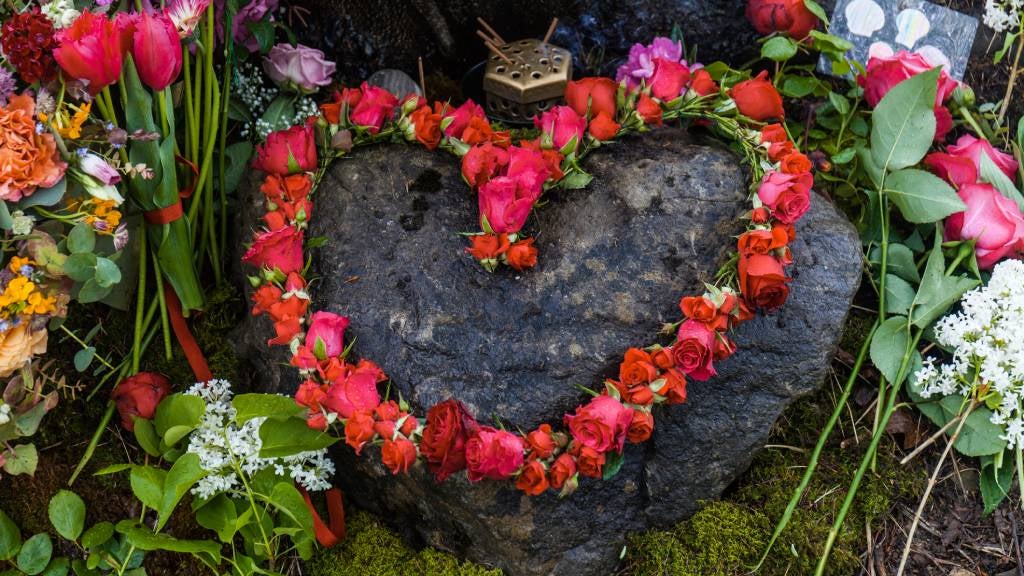Doing death differently: How to plan a modern funeral service

The way we plan and carry out funerals is changing. While traditional services in churches or chapels still have their place, many Australians are embracing alternative ideas for funerals that authentically reflect the deceased’s personality and life.
Rachel Michael, celebrant and funeral director, says that things aren't as rigid as they once were: “Traditions aren’t as important as they used to be, so if you have a unique idea you’d like included in a funeral service, ask about it when you meet with your funeral director.”
Here’s how you can plan a modern funeral that celebrates life in a meaningful and personalised way.
The rise of personalised memorials
Personalisation is increasingly at the heart of modern funerals. More families nowadays are looking at ways they can authentically celebrate their loved one's individuality – rather than just following the standard protocol. A funeral can be held in a location that’s meaningful to the deceased, for example, from their favourite park to a sports venue.
“You don’t have to have a funeral in a church or chapel,” Rachel says. “You can choose a venue that reflects the personality and interests of your dearly departed. I’ve officiated services at a racecourse, rowing club and national park.”
Picking a place that is truly meaningful to your family can add a comforting sense of intimacy and celebration. It can also help the attendees to remember their loved one in a way that feels authentic to their personality.
Learn more: Getting through the first 4 weeks after losing a loved one
Unique funeral ideas to celebrate a life
Modern funerals are also starting to incorporate more unique and personal touches that truly celebrate the individual’s life. Rachel says you might want to think about encouraging attendees to wear the deceased's favourite colours or bring a flower from their garden to be given as a heartfelt tribute, which can make a funeral or memorial service truly personal. She also suggests other personal touches like unique funeral favours, like custom-made bookmarks featuring a favourite quote or photo or seed packets for guests to plant in memory of your loved one.
Spend some time thinking about activities that represent the person’s interests or hobbies. If they were an avid gardener, guests could participate in a collective planting activity during or after the service. For art enthusiasts, guests might create a collaborative artwork or write personal messages on canvases to form a commemorative collage.
Learn more: Tools to help you write a touching eulogy
Eco-friendly funeral considerations
Rachel goes on to share that eco-friendly funerals have become more and more popular as Australians become increasingly environmentally conscious. “This approach minimises the environmental impact and allows for a natural return to the earth.”
Eco-friendly funerals might involve using biodegradable coffins, urns or shrouds, as well as avoiding embalming chemicals. It’s best to check the policy in your state or territory, as this could vary depending on where you live.
“Planting a memorial tree or creating a memory garden can also provide a lasting tribute,” Rachel adds, saying that it serves as a beautiful, living reminder of the loved one's legacy and oneness with nature.
Learn more: How to talk about grief
Creating a digital legacy
Most funerals these days tend to incorporate digital elements. Everything from digital slideshows to video montages featuring memorable moments and milestones throughout the deceased's life have become a staple of funeral services.
“Digital slideshows or video montages are commonly played during funeral services these days,” Rachel says. “A personal touch I’ve only seen a couple of times, is to video yourself sharing a special message, which can be played at the funeral service.”
To extend this digital legacy, families might want to create an online memorial website or dedicated social media page. Through these platforms, friends and family can – in their own time – share stories, photos and condolences. For years to come, you’ll have an interactive and ongoing tribute that’s accessible from anywhere in the world.
Tips for planning a modern funeral
Planning a funeral is always challenging, but with clarity and a mind for collaboration you can ease yourself into the process. Working closely with your funeral director is especially a good idea, Rachel says, so share your ideas and vision, and always communicate openly – because they are there to help you.
Also ask about the range of services on offer, including unique requests or alternative venues. The clearer you are about your wishes, the more effectively they will be able to facilitate a service that genuinely honours your loved one.
Finally, a modern funeral should reflect the true essence of the individual. Embracing special funeral ideas like personalised mementos or innovative ceremony formats can help attendees to connect on a deeper level and authentically honour their memory.
Learn more: A funeral director's tips on what to do after someone dies
Practical tips for planning
- Plan your budget: It’s good to be aware of the actual costs of a funeral and communicate any financial constraints early on to avoid undue stress.
- Think about the venue choice: Go beyond traditional spots. Reflect on places that have personal significance.
- Guest participation: Involve attendees by including personal touches, whether that’s collective storytelling or creating collaborative memorial keepsakes.
- Cultural sensitivity: Respect cultural traditions and customs (if applicable). Bottom line: make sure your choices align with your loved ones’ wishes and resonate meaningfully with the family and friends who will be in attendance.
Planning a funeral that genuinely reflects a person’s passions and values will not only honour their memory but also give comfort and closure to those left behind. After all, funerals are about honouring the deceased, and today, the possibilities for doing this are nearly limitless.
Have you ever thought about your own funeral, or perhaps how you or your loved ones will pay for it? Take the financial stress away from your loved ones when planning your funeral or memorial, consider funeral insurance. Learn more about Guardian Funeral Insurance or request a quote online today.
2 Jun 2025
